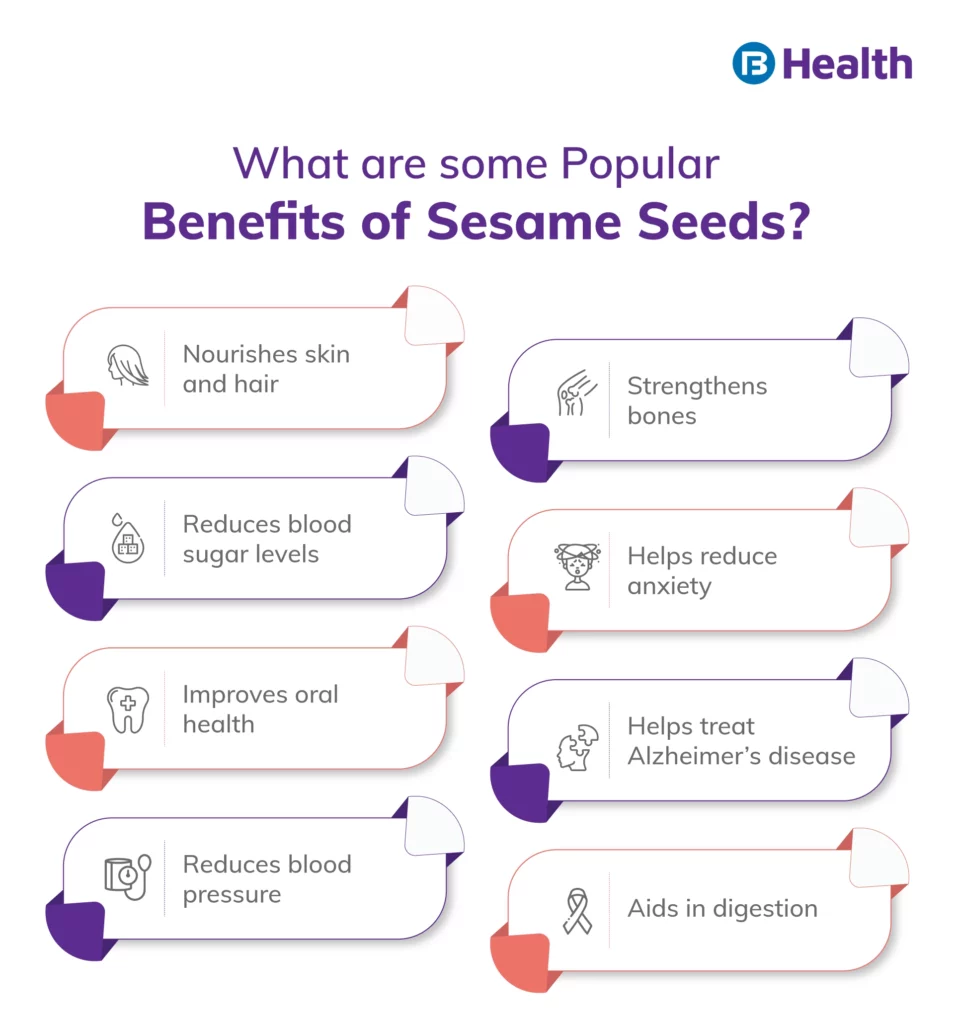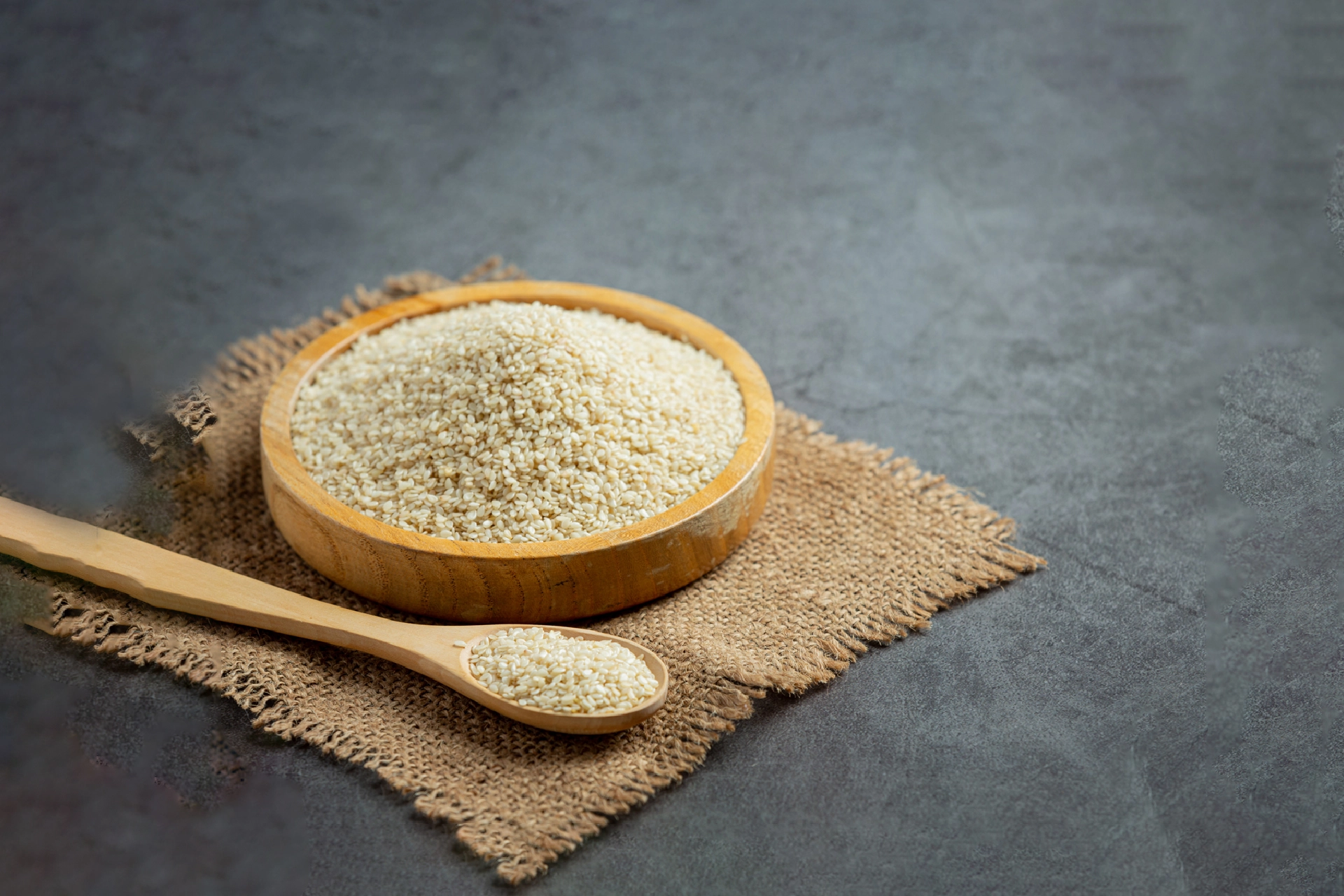Nutrition | 7 min read
Sesame Seeds(Till): Nutritional Value, Benefits, Uses
Medically reviewed by
Table of Content
Synopsis
Sesame seeds are rich in protein, healthy fats and other nutrients that offer various health benefits when consumed regularly. You can incorporate sesame seeds in various ways into your meals; however, it tastes best when it's slightly roasted in low flame. Check out this blog to learn more about adding them to different recipes and making them even healthier and tastier.
Key Takeaways
- Sesame seeds help reduce anxiety and treat Alzheimer’s disease
- You can use these seeds raw, in powder/paste or roasted form, and blend them into gravies
- There are several varieties of sesame seeds; the white ones have a greater iron content than the black ones
Sesame seeds' benefits are immense, and they are used as ingredients in many cuisines. These seeds are from the flowering sesame plant and have the highest oil content. In addition, sesame seeds are known for their nutty flavour that is released when they are roasted for a few minutes. They can be consumed in raw or dried form or as a roasted snack.
Sesame Seeds Nutrition Value
Sesame seed benefits are obtained from their essential minerals such as copper, zinc, calcium and magnesium. It also contains high amounts of antioxidants, fibre, protein and vitamin B complexes. Given below is the nutritional value of sesame seeds (100 gm).
- Energy – 563 kcal
- Carbohydrates – 25 gm
- Dietary Fiber – 16.8 gm
- Protein – 18.3 gm
- Fats – 43.3 gm
- Calcium – 1450 mg
- Phosphorous – 570 mg
- Iron – 9.3 mg
- Zinc – 12.20 mg
- Copper – 2.29 mg

Top 10 Benefits of Sesame Seeds
There are several sesame seeds benefits due to their rich content of minerals. The top sesame seeds benefits are:
Sesame Seeds for Hair
Sesame oil health benefits include certain organic properties that can enhance hair strength and restore the skin glow. Additionally, sesame seeds are rich in Vitamin B complexes such as thiamine, folic acid, riboflavin and pyridoxine. Apart from oral consumption of sesame seeds, you can regularly massage your scalp and body with sesame oil.
Research has proven that sesame seeds benefit the skin and also include anti-ageing properties that slow down hair greying and nourish the scalp and hair. [1] The SPF qualities in sesame oils can protect your skin from the harmful effects of the sun.
Additional Read: Health Benefits of Sprouts
Sesame Seeds for Bone Health
Sesame seeds nutrition has significant amounts of calcium, an essential nutrient to keep the teeth and bones strong. It also has zinc, a vital ingredient for strengthening bone structure. Regular consumption of sesame seeds has proven even to prevent osteoporosis in the future.
Sesame Seeds Good for Diabetes
Several studies have shown that consuming sesame oil or seeds can help regulate blood sugar levels. [2] As an unsaturated oil, sesame oil can organically regulate blood sugar. Hence, sesame seeds are ideal for diabetes as they can work as a natural blood glucose regulator due to their high protein, low carbohydrate and healthy fat content. Moreover, pinoresinol, a plant-based ingredient in sesame seeds, plays a key role in managing blood sugar levels.
Sesame Seeds for Blood Pressure
One of the sesame seeds benefits is that sesame oil has polyunsaturated fats and compounds that aid in keeping blood pressure levels under control. Research states that sesame oil can help better manage blood pressure and related health issues in hypertensive patients. [3]
Sesame, sesamol and vitamin E in sesame seeds can prevent plaque buildup in the arteries and help maintain good heart health. Sesame seeds also contain coenzyme Q10, which helps treat heart failure.
Additional Read: How to Make Heart Strong?Improves Energy Level
Apart from the numerous minerals and vitamins, sesame seeds also boast a healthy omega-3 fat content that is an excellent source of energy. In addition, high-food value sesame seeds are rich sources of iron, fibre, calcium, phosphorous and magnesium. These ingredients can boost the body's energy levels and meet daily energy requirements.
Cures Allergy and Pain
While copper in sesame seeds helps patients with rheumatoid arthritis, magnesium can help tackle respiratory problems. Non-steroid inflammatory drugs (NSAIDs) used for pain treatment are expensive and may cause side effects. A topical application of sesame oil can be used as a substitute to alleviate and relieve pain.
Combat Thyroid Problems
As per research, sesame seeds can supply up to 18% of the daily selenium intake, making them an ideal choice to combat thyroid problems. [4] Moreover, sesame seeds benefits include the presence of copper, zinc, iron and vitamin B6 in it, which aids in creating thyroid hormones and managing thyroid health.
Immunity Booster
The high amount of zinc in sesame seeds can activate T-lymphocytes-a component of our body’s immune system. They identify and attack the invading microbes. According to a study, sesame seeds fulfil 20% of recommended daily intake of zinc. [5]
Additional Read: Best Zinc Rich FoodsHelps Digestion
Black sesame seeds benefits are that they are very helpful for constipation and digestive issues. Their high fibre and unsaturated fatty acids can cure constipation and clear the digestive tract. While sesame oil can act as a lubricant for your intestines, the fibre helps to maintain smooth bowel movements. It helps protect the colon and reduces the occurrence of gastrointestinal ailments.
Sesame Seeds Reduce Cholesterol
Sesame seeds have an ingredient called lignin, a plant compound that can reduce cholesterol. They also have phytosterols that can increase your immune response and reduce certain cancer risks.
Potential Uses of Sesame Seeds
For Mental Well-Being
An imbalance of serotonin in your body can cause stress or depression. Sesame seeds use include producing serotonin that can lower anxiety and create a positive mood.
For Liver Disease
Accumulation of liver fat leads to fatty liver disease that is caused by several internal or external factors. Sesame seeds can prevent fatty liver [6] and related disorders and enhance resistance to oxidative stress.
For Oral Health
Sesame seeds oil pulling can have an astringent and antibacterial effect on teeth. Sesame seeds benefits have also been linked to lowering the presence of the common streptococcus bacteria that can cause mouth problems. Sesame oil pulling can also lower dental plaque and improve overall gum health. You must get a doctor consultation for more information and guidance.
For Alzheimer Disease
The anti-inflammatory and antioxidant properties of sesame seeds can reduce the formation of pro-inflammatory molecules that can cause Alzheimer's disease. Additionally, they can better manage the disease by inhibiting the impact of reactive oxygen molecules on brain cells. However, getting a general physician consultation for proper advice would be best.
For Anaemia
Iron is present in abundance in sesame seeds. Iron helps produce hemoglobin, red blood cells and hematocrit in the body, preventing anaemia.
How to Use Sesame Seeds in Daily Life?
You can gain sesame seeds benefits by including them in many different ways in your diet:
- As seeds
- As seed oil
- As milk
- As seed powder
- As seed capsule
- As seed paste
Sesame Seeds Precautions
Sesame seed uses might require the following precautions. Have a look at some of them below:
- Sesame seeds must be avoided by individuals who have gout as they contain oxalates
- Sesame seeds must be stored in air-tight containers without any moisture
- Sesame seeds and oil may trigger allergic responses in some people
- Sesame seeds may have a negative effect if taken in large quantities as they get stored in the stomach without being digested
If you are taking medication for diabetes or hypertension, it is better to avoid sesame seeds

Sesame Seeds Recipes
Here are some sesame seeds recipes for making your meals healthier and tastier:
Sesame Laddu
Roast the sesame seeds until they turn brown. Then, add the powdered jaggery and sesame seeds into the mixer and grind until it becomes soft and mixes evenly. Make small-sized balls out of the mixture and add milk if it is too dry.
Tahini
Tahini is a classic middle eastern dish which is a sauce made with sesame seeds. To prepare Tahini, first, roast the sesame seeds until they turn golden brown. Take the roasted seeds and grind them in the mixer with some olive oil until you get a smooth paste; add more olive oil if needed. Your homemade Tahini is ready. Sesame seeds benefits are abundant if you consume them as per the recommendation of your dietitian. They provide essential vitamins and minerals and can prevent chronic diseases. If you have medical questions or concerns about including sesame seeds in your diet, contact a doctor from Bajaj Finserv health's extensive physician network.
Side Effects of Sesame Seeds
Besides sesame seeds benefits, they can also affect you adversely sometimes. Some of these same seeds side effects include the following:
- Sesame seeds are mostly safe when used on the skin or taken orally. But there is a risk of allergy in some people if consumed in excess
- The fibre content in sesame seeds may cause irritable bowels in some people and sometimes blockage of small and large intestines
- When you have milk after consuming sesame, you can get gas or acidity as the milk takes time to digest and coagulate
- Excessive consumption of sesame seeds may cause blood sugar and blood glucose levels to drop drastically low
- Fibre in sesame seeds can form a layer over the appendix, causing pain and bloating
References
- https://www.sciencedirect.com/science/article/abs/pii/S0308814605006801
- https://www.ncbi.nlm.nih.gov/pmc/articles/PMC5444487/
- https://www.ncbi.nlm.nih.gov/pmc/articles/PMC5444487/
- https://www.ncbi.nlm.nih.gov/pmc/articles/PMC5444487/
- https://www.ncbi.nlm.nih.gov/pmc/articles/PMC5444487/
- https://pubmed.ncbi.nlm.nih.gov/11368649/
Disclaimer
Please note that this article is solely meant for informational purposes and Bajaj Finserv Health Limited (“BFHL”) does not shoulder any responsibility of the views/advice/information expressed/given by the writer/reviewer/originator. This article should not be considered as a substitute for any medical advice, diagnosis or treatment. Always consult with your trusted physician/qualified healthcare professional to evaluate your medical condition. The above article has been reviewed by a qualified doctor and BFHL is not responsible for any damages for any information or services provided by any third party.





